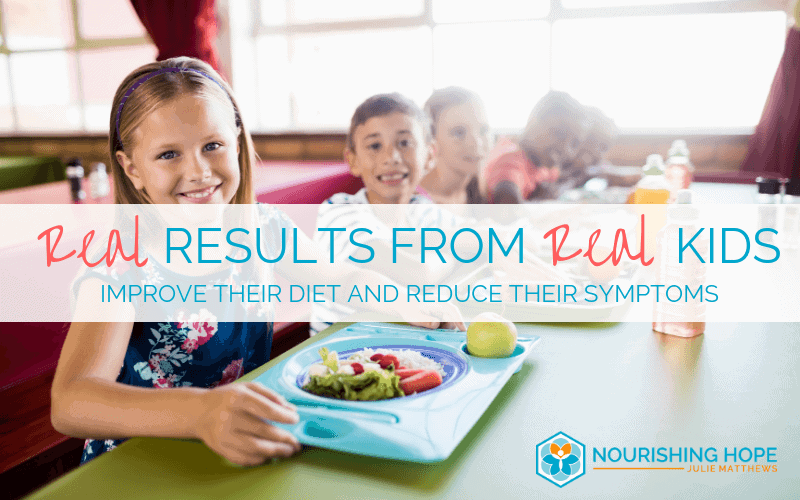
Improve Their Diet and Reduce Their Symptoms
When a child is diagnosed with autism or ADHD, parents go looking for solutions. They seek therapies and approaches to support their child’s well being.
But with many alternative approaches being touted, it can be difficult to figure out what’s real. Some people explore the science, others look for stories of families who’ve been successful to learn what worked for them.
They don’t want to waste time on things untested. Maybe you can relate.
Fortunately, there is such an approach – and it’s easy to do. It’s called Nourishing Hope – making strategic diet and nutrition changes that lead to improved health, learning, and behavior.
Parents often have questions about diet and nutrition, and why they haven’t heard of the approach. They want to know how to do it safely and effectively, and they want to hear the success stories of others just like them. This helps build their confidence in giving it a go.
There are many real results expressed below, and rest assured that my Nourishing Hope for Healing Kids program, developed from 20 years supporting children and families with autism, gives you all the information and science needed to improve the diet of your child and reduce their symptoms – easily, safely, and effectively.
Though before I explain the what, why, and how, let’s address some very common questions parents have when they first learn that food and nutrition matter.
[Watch below] New Video from 2022 Parents
Common Parent Questions
“If nutrition helps ADHD & autism, why haven’t I heard about it from my doctor or in the media?”
Many people simply don’t know the underlying physiological conditions involved with ADHD and autism and don’t realize the power of nutrition to improve systems and the symptoms they affect., They are convinced that genetics determines who your child is and what their potential may be. Doctors gets very little nutrition education, that healthcare today views autism as a “behavioral” disorder and sanctions mainly behavior modification and speech therapy to help
So it’s not surprising that the media and the world at large haven’t yet noticed the important scientific work that’s been done on this subject.
But you’ve noticed – and that’s a great start for you and your child.
The truth is: there is extensive science on nutrition for autism and ADHD, and families getting incredible results with diet and nutrition strategies. When you are able to address the underlying nutritional and biochemical needs with foods and nutrients, you see improvement in their speech, constipation, diarrhea, anxiety, hyperactivity, and sleep issues, as well as their autism and/or ADHD symptoms.
“If I put my child put on a special diet like gluten-free and dairy-free, will they be nutritionally deficient?”
A healthy GFCF diet, done right, can include all of the nutrients your child needs.
In fact, a child with autism or other neurobehavioral disorder is already likely to be deficient in various nutrients, and needs to focus on good nutritious food, something a strategic diet can help with. Additionally, dairy and wheat can be inflammatory to the digestive system, and can limit the absorption of nutrients in their meal, including not being able to absorb the calcium from dairy foods.
However, adjusting your child’s diet by removing inflammatory foods like dairy and gluten and adding nutritious foods improves their uptake of the nutrients they do eat.The goal is a healthy gluten-free and dairy-free diet.
“A special diet is too expensive!”
It doesn’t have to be. A special diet can be done to fit almost every budget. Families from varied circumstances around the world are making it work.
I explain there are some great ways to save money on a special diet – and that no longer buying processed and big name brand foods can reduce the grocery bill.
Now that we’ve answered some of your common questions, let’s explore how food and nutrition affect your child’s behavior.
How Does Diet Affect Children’s Behavior?
Diet and nutrition are the crucial building blocks that set your child up for a healthy life. You want the very best for your child, but the Standard American Diet (SAD) is not sufficient for children with autism, ADHD, or other neurodevelopmental conditions, and contain artificial additives that cause significant behavior and learning challenges. There’s a long-standing link between the severity of ADHD in children and a diet high in artificial colors[1] – but such substances can also affect neurotypical children in large amounts.
Genetically Modified Organisms (GMOs) are another area of concern for parents of children with neurodevelopmental delays. Produce from GMO plants is best avoided, as the plants are genetically modified to withstand disease – often using the DNA from bacteria, or other plants that people can be allergic to. Is it any wonder that eating GMO food increases the chances of developing allergies?[4] GMOs are bad news for all of us, but for children with autism or ADHD who are far more sensitive to toxins, it could be making their symptoms worse.
80% of children with developmental delays struggle with picky eating.[5] So it’s a common problem – and you may think it’s impossible to change your child’s habits if he or she only eats three or four particular foods. However, a shift in diet may reduce picky eating in your child as they shake off their addiction to gluten in wheat, and casein in milk – which can act like morphine on neurotransmitters in the brain.[6] Often it can take days or even weeks to wean your child off these addictive foods, but replacing them with more nutritious food has a knock-on effect of helping other foods seem much more appetizing – deficiencies in nutrients such as zinc can make other foods taste bland.[7] Finally, heading off yeast overgrowth by eating better can reduce sugar cravings – and help balance the gut microbiome.[8]
The Experiences of Parents of Children with Autism
[NEW 2022 Video Below]
But don’t take our word for it – at Nourishing Hope we’ve helped thousands of families improve their child’s nutrition, resulting in a huge improvements in health, learning, and behavior.
Jennifer was at a loss for what to do next – so she started to research how she could help her son. She first encountered my work while attending a conference on autism…
“I was at a conference listening to nutritionist Julie Matthews. She was showing a slide of various behaviors, pretty accurately describing my son. At that time, my son had started showing some aggressive behaviors, mostly directed towards me (biting, causing bruises), and I was getting phone calls from school about him lashing out. The follow up slide was which foods to eliminate in order to stop the behaviors. It was all of my son’s favorites. I immediately texted my husband and told him, when I got home, we were doing a diet overhaul. We took out all of the problem foods, and his behaviors stopped! The change was so dramatic that his doctor, who had wanted to start medication, decided it was unnecessary. Do not discount diet!”
Sarah’s son was diagnosed with autism when he was three, but she was determined to find a way to improve his life. The results of following Nourishing Hope also impressed an otherwise skeptical doctor…
“I’m writing today with elation and still some disbelief to say thank you for all of the insights and learning you have shared over the years. They sure work!!! What a miracle! My 17 year old son has just received feedback from the diagnostician who gave him his diagnosis of PDD-NOS way back when my son was 3. This doctor is a very capable, very conservative allopathic practitioner – one of the more noted practitioners in the Boston area. While he doesn’t believe in autism healing per se, he happily and confidently said that my son is ‘in remission.’ ‘The diagnosis just doesn’t apply to him anymore!’ he continued. Lots of bone broth, epsom salt baths, GFCF eating, lots of exercise, and lots and lots of stress reduction. It ALL works. Thank you for showing me and the rest of the autism community the way forward.”
Success Stories from Nourishing Hope for Healing Kids
Here are further real results from real kids. All of these are from Nourishing Hope for Healing Kids, my personalized nutrition program for parents and individuals with autism, ADHD, and other special needs.
Eating vegetables can make a difference!
“He is eating vegetables like never before and is more willing to experiment or taste new things. I don’t force anything at all. We are juicing now, so he gets access to foods & veggies he never was eating before – particularly greens. Improvement – I think ATEC score speaks for itself, 19 points improvement! I was surprised! Mainly communication & cognition.”
– Parent of a 10 year old boy with autism
Gluten-Free, dairy-free and soy-free can be life-changing
“The GFCFSF diet has been the most life-changing. Within a few days, his tics were reduced significantly. The supplements have helped with focus, mood, not being too picky in eating, and regular BM.
The Nourishing Hope Program is working for my son. With diet and lifestyle change, it has helped improve his quality of life. When I tell close friends and family that he has Tourette’s, they are all shocked because they don’t see him ticcing! This has been life-changing! Thank you Julie Matthews!”
– Catherine S.
Evolving diet over time can lead to further improvements
UPDATE 2020 “Ever since we’ve followed Julie’s program, my son’s quality of life has just kept improving. In fact, since the summer last year, he has flown 5 times with the Civil Air Patrol. He has even sat on the left seat!!! He’s 14 and he’s working on his Private Pilot License.
He himself loves being on the Paleo diet, and he appreciates the changes I’ve made around the house and in our lifestyle.“
– Catherine S.
Improvements in picky eating
“ALREADY SEEING CHANGES! I just wanted to share that I am only 5 days into step 1. My son is GFCF already but has severe texture/gagging issues with vegetables. I’ve had to purée them and hide them and syringe smoothies just to get some nutrients in. Today—-5 days in—-and he is already eating organic roasted potatoes, butternut squash and carrots cut into cubes. No gagging!!!!”
– M.H., parent of a 9 year old son with a moderate ASD diagnosis.
Diet can improve other conditions beyond autism
“We have tried for more than twenty years to figure out how to counteract sensory issues and limited food intake as well as other ASD behaviors. We felt we progressed notably during this wonderful, educational series and many of our persistent questions were answered for the first time.”
– Anne Dolivo on behalf of her daughter Caitlin
Therapeutic diets can improve autism and physical symptoms
“This program is pure gold! It was a game changer for my child, helping me to address some of her very long-term problems. Even though we were already experienced with many diets, this program gave lots of new information. It gave knowledge that I have found nowhere else, helping me to compare the different therapeutic diets and thus build the right bioindividual nutrition for my child. The result? Due to this program, my child’s total ATEC [Autism Treatment Evaluation Checklist] score dropped from 114 to 86! Now she is a much happier child with less pains and problems and more able to realize her potential for growth and development.”
– Parent of a child with autism
The Science Behind Neurobehavioral Disorders and Nutrition
There is a lot of science behind my approach at Nourishing Hope – drawn from many sources. My article Why Diet Matters delves deeper into the biochemical mechanisms that contribute to ADHD, autism, and other neurobehavioral disorders – but in short, certain foods contribute to the following:
- Issues with inflammation
- Trouble digesting certain substances such as gluten, or digesting crucial nutrients
- Difficulty with methylation (gene signalling)
- Dysfunctioning detoxification pathway
- Raised levels of oxalates which can contribute to poor nutrient uptake.
Nourishing Hope looks at the body as a whole – a complex system with plenty of interplay between different bodily functions. As such, it’s rarely as simple as giving them a daily supplement, or cutting out a particular food – however, it’s a good starting point.
I co-authored a study in 2018 entitled Comprehensive Nutritional and Dietary Intervention for Autism Spectrum Disorder—A Randomized, Controlled 12-Month Trial.9 We trialed a healthy gluten-free, casein-free diet, soy-free diet combined with supplementing vitamins, minerals and essential fatty acids.
We found that following this specialized diet:
- Raised IQ by 6.7 points
- Improved developmental age by 4.5x
- Reduced digestive symptoms
- Improved cognitive thinking, attention/focus and sociability
- Reduced anxiety, depression, irritability, and aggression
To read more about our findings click here.
The Link Between Autism and Chronic Pain
– and How to Help Your Child
There’s an idea that children with autism are less likely to register pain – but that’s untrue.[10] In actuality, many children with autism who don’t seem to show pain are often hurting on the inside, often experiencing abdominal pain alongside gastrointestinal discomfort.[11] If you’ve ever watched a loved one struggle with gastrointestinal disorders such as constipation or inflammatory bowel syndrome (IBS) then you’re all too aware of how distraught it can leave your child. And how you’d do anything to make those symptoms go away.
In fact, you’d do anything to improve your child’s quality of life – to reduce their anxiety in new and unfamiliar situations, help improve their social connections, and have a better relationship with the wider world. Though it may seem like an impossible dream, Nourishing Hope can help you and your child make a start on that path to their new future.
A Safe Method to Reduce Autism Symptoms in Children
While researching your child’s condition online you will need to weed through what works and what’s safe. Let’s face it: it can be difficult to work out what’s real, and what’s nonsense. But you’ll be relieved to hear, not only is Nourishing Hope backed by studies – it’s safe and effective.
After all, what can be safer than eating healthy right? Making changes to your child’s eating habits helps reduce their autism or ADHD symptoms – and improve health and help prevent disease.
When you want to make diet and nutrition improvements for your child, check out my Nourishing Hope for Healing Kids nutrition program for parents.
The Nourishing Hope program gives you all the information and science needed to improve the diet of your child with autism or ADHD and reduce their symptoms. And by using the Nourishing Hope questionnaires and handouts throughout the course, you’re able to tailor the approach to your child and adjust accordingly.
My program is risk-free.
Share with us how nutrition has helped your child in the comments.




0 Comments